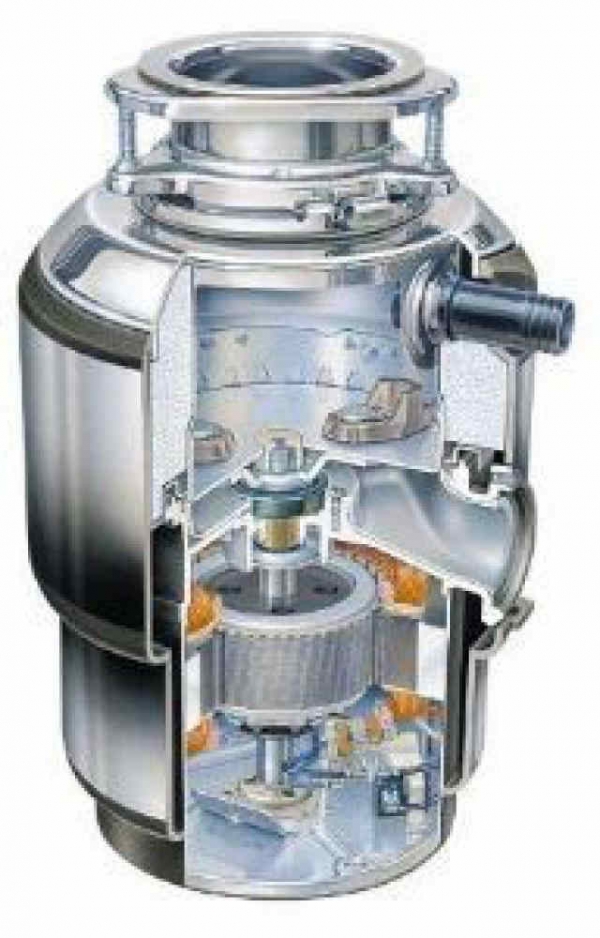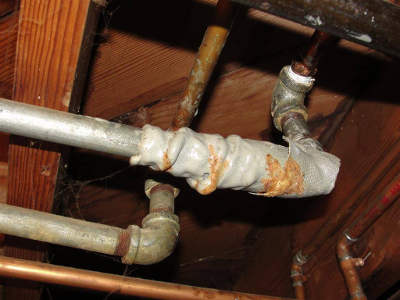Garbage Disposal Replacement
It is easier to understand what is wrong with our garbage disposal when we know how it works.
 Here we see a cutaway view of a standard garbage disposal. There are many types and designs of garbage disposals on the market. Your garbage disposal might not look exactly like the one in the photo but the mechanics are similar. The food enters from the top through the throat. The plate with the blades spin when turned on which grind the food. The food particles and water pass through narrow slits in the side of the chamber. Dishwasher discharge also enters the chamber via the black port on the right. If the knockout for the dishwasher has not been removed prior to installation, the dishwasher cannot discharge and may cause damage to the unit, leaking and flooding. This is why it is important to have a licensed plumber install your garbage disposal to insure safe proper installation. Garbage disposals have electric, water and metal moving parts and vibration. This is a recipe for disaster if you get the wrong installer.
Here we see a cutaway view of a standard garbage disposal. There are many types and designs of garbage disposals on the market. Your garbage disposal might not look exactly like the one in the photo but the mechanics are similar. The food enters from the top through the throat. The plate with the blades spin when turned on which grind the food. The food particles and water pass through narrow slits in the side of the chamber. Dishwasher discharge also enters the chamber via the black port on the right. If the knockout for the dishwasher has not been removed prior to installation, the dishwasher cannot discharge and may cause damage to the unit, leaking and flooding. This is why it is important to have a licensed plumber install your garbage disposal to insure safe proper installation. Garbage disposals have electric, water and metal moving parts and vibration. This is a recipe for disaster if you get the wrong installer.
"Do I Need a New Garbage Disposal?"
For the twenty six years that I've been a plumber, one of the first things that customers have asked me when servicing their garbage disposal is, "Do I need a new garbage disposal?". This is a little bit of a loaded question and usually subjective to the individual customer with a few exceptions. The simplest way to break this down is to separate the service into two categories: 1. Must replace and 2. Can replace.
Disclaimer- Electricity is dangerous and even fatal, always consult with a professional before attempting any repairs yourself!
Must replace: You must replace your garbage disposal whenever any of the following apply:
- Garbage disposal will not turn on. The electricity has been verified to be working all the way to the aperture with the switch on. Push in the reset button on the bottom of the unit and verified it stays closed. (If you don't know what some of that means it's ok, but you should probably have a professional take a look to avoid possible injury or death by trying it yourself.)
- Grinding metal and overload switch pop. When key is inserted into the bottom of the garbage disposal and turned, there is a grinding metallic sound even after turning several times in both directions. This indicates a failed bearing or excessive internal corrosion. A second indicator of this would be when you turn on the switch to the unit, the overload switch pops open. (Warning! Never turn on the switch to the unit with the garbage disposal key inserted into the bottom!)
- Angry panel breaker. If the panel breaker trips when you turn on the switch for the unit, There is a dead short. This is a very dangerous condition and must be addressed immediately by a qualified professional!
- Water Leaking. Water leaking from below the metal throat or from the bottom of the unit is a sure indicator that there's a bad seal and the unit must be replaced.
Can replace:
- Leaking from the metal throat/up means that the throat is not sealed properly. The garbage disposal has not been locked properly in place, or the throat seal needs to be replaced. I suggest that if the throat is leaking, it's probably a good idea to go ahead and change the garbage disposal.
- If a unit is over 5 years old and gives you any trouble at all, I suggest replacing it. In my experience garbage disposals last around 5-7 years on average. This will vary greatly depending on the quality of the local water and the types of chemical the individual uses.
Garbage Disposal Do's and Dont's
Having serviced these units and those of other manufacturers for the past twenty six years, I have some pretty strong opinions on the subject. I feel that Insinkerator is quite liberal and overly optimistic on the topic of what should go into a garbage disposal. There are several factors to consider which can help you make choices which are best for your particular conditions and thereby minimize the chances of having to endure a plumber and his gross sewer machine in your newly remodeled kitchen working on your brand new tile.
Things to consider before cramming certain foods into your garbage disposal:
 How old is my house? If your house is older than the movie "Rainman" (1988), chances are you shouldn't be cramming food into your garbage disposal like its a garbage compactor. Homes that are over twenty-five years old tend to have piping which is either made of copper, galvanized steel pipe, or cast iron. Galvanized steel piping is readily identifiable by the threaded ends which are transitioned by super tight 90 degree turn which have hollow insides and narrow entrances which love gathering food particles. It is usually at a point of change of direction where a clog will begin and work its way back upstream like an accordion until the last hole closes with food which then compresses the whole works.
How old is my house? If your house is older than the movie "Rainman" (1988), chances are you shouldn't be cramming food into your garbage disposal like its a garbage compactor. Homes that are over twenty-five years old tend to have piping which is either made of copper, galvanized steel pipe, or cast iron. Galvanized steel piping is readily identifiable by the threaded ends which are transitioned by super tight 90 degree turn which have hollow insides and narrow entrances which love gathering food particles. It is usually at a point of change of direction where a clog will begin and work its way back upstream like an accordion until the last hole closes with food which then compresses the whole works.
Why Your Garbage Disposal Is Not Working?
If you've found yourself asking, "Why is my garbage disposal not working?" you're not alone. A malfunctioning garbage disposal can be a real kitchen headache. In this comprehensive guide, we'll delve into common issues and provide practical solutions to get your disposal back in top-notch condition.
Common Reasons and Solutions:
- Jamming Issues:
- Problem: Garbage disposals often get jammed when foreign objects or large food particles obstruct the blades.
- Solution: Use an Allen wrench to manually turn the disposal's motor shaft and dislodge any obstructions. Avoid using your hands, and always turn off the power before attempting to fix a jam.
- Electrical Problems:
- Problem: A lack of power or electrical issues can render your garbage disposal ineffective.
- Solution: Check the power supply and reset the disposal by pressing the reset button, usually located on the bottom of the unit. If the problem persists, consult a professional for electrical diagnostics.
- Overheating:
- Problem: Garbage disposals have built-in overload protection that can cause them to overheat and shut down.
- Solution: Allow the disposal to cool down, then press the reset button. Consider reducing the load and running cold water while operating the disposal to prevent overheating.
- Clogs in the Drain Line:
- Problem: Clogs in the drain line can impede the proper flow of waste, leading to a malfunctioning disposal.
- Solution: Use a plunger to clear minor clogs. For persistent issues, professional drain cleaning services may be necessary.
Preventive Maintenance Tips:
- Run cold water while using the garbage disposal to solidify grease and move it more easily through the drain.
- Avoid putting large quantities of fibrous or hard-to-grind items like celery, eggshells, or bones into the disposal.
- Regularly clean your disposal by grinding ice cubes and citrus peels to eliminate odors and maintain sharp blades.
When to Seek Professional Help: If you've followed the troubleshooting steps and your garbage disposal is still not working, it's time to call in the experts. Professional plumbers, like those at Applause Plumbing, have the experience and tools to diagnose and fix more complex issues. Contact us today!
Conclusion: Understanding why your garbage disposal is not working and implementing these troubleshooting tips can save you time and money. Remember to prioritize safety, and when in doubt, consult a professional plumber for expert assistance. Keep your kitchen running smoothly by taking proactive measures and addressing disposal issues promptly.

